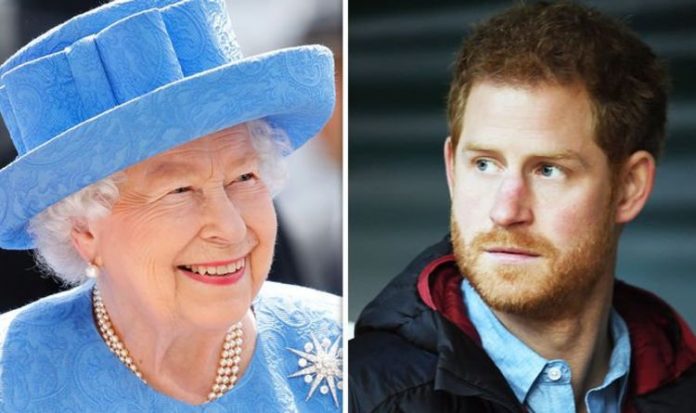The Queen took part in an unusual message this week when she said the news industry had proven its worth during the pandemic. Her words marked the beginning of Journalism Matters Week, organised by the News Media Association, which will include an online vote to determine the public’s favourite media campaigns from the last year. She wrote: “The COVID-19 pandemic has once again demonstrated what an important public service the established news media provides, both nationally and regionally.
“As our world has changed dramatically, having trusted, reliable sources of information, particularly at a time when there are so many sources competing for our attention, is vital.”
She also noted how the community support provided has been “invaluable” during these trying times.
Her words stand in stark contrast with Prince Harry and Meghan Markle’s recent actions against the press.
The Sussexes are taking multiple legal actions against the media.
Meghan is currently embroiled in a court battle against Associated Newspapers after one of its outlets published a letter she wrote to her father before her wedding.
Meghan and Harry also announced that they would not be taking part in the Royal Rota system, which has been used by the Firm for more than 40 years, when they announced their decision to step down.

Queen Elizabeth II and her grandson Prince Harry (Image: Getty)

The Queen has a different approach to the media compared to Meghan and Harry (Image: Getty)
The couple tried to control their own media image through launching their now-defunct website, sussexroyal.com, and its corresponding Instagram account instead.
In a heartfelt speech from February, the Duke of Sussex said he and his wife had “no other option” than to step back from the Firm, alluding to the “powerful force” of the media.
It is well known that Harry has long since hated the publicity that comes with his role, especially after his mother Princess Diana’s death.
He and his wife have also frequently requested privacy throughout their relationship.
In 2016, he confirmed his relationship with Meghan when he released a statement asking for the media to respect her privacy after the “nightly legal battles to keep defamatory stories out of papers”, and the “bombardment” of her friends and loved ones.
READ MORE: Philip’s advice to ‘never discuss yourself’ which Sussexes ‘ignored’
The Queen announced her support for the couple’s decision to leave the Firm earlier this year — and said that “we respect and understand their wish to live a more independent life as a family”.
Yet, Meghan and Harry have also exposed themselves to greater media scrutiny by providing explosive insights into their personal lives.
For instance, in 2017, the Duke of Sussex explained how he struggled with his mental health.
He told the Daily Telegraph: “I can safely say that losing my mum at the age of 12, and therefore shutting down all of my emotions for the last 20 years, has had a quite serious effect on not only my personal life but my work as well.
“I have probably been very close to a complete breakdown on numerous occasions when all sorts of grief and all sorts of lies and misconceptions and everything are coming to you from every angle.”
Such an emotional interview broke down boundaries within the Royal Family, and showed his great vulnerability.
With such an emotional confession he was boycotting the royal tradition of the “stiff upper lip”.
DON’T MISS
Donald Trump actually ‘legitimised Meghan Markle’ through public snub [INSIGHT]
Eugenie to swerve away from Royal Family’s tradition to avoid ‘curse’ [EXPLAINED]
Royal warning: Queen put her foot down after last ‘royal reality show’ [EXPOSED]

A still from the ‘Royal Family’ documentary which aired in 1969 (Image: Getty)
Meghan, too, pulled apart that tradition during an ITV documentary last year.
She said that although she had tried to employ the “stiff upper lip” idea, she thought it was likely to be “internally damaging”.
While the Queen has never given any interviews and lives by the mantra of “never complain, never explain”, the Sussexes have regularly revealed their feelings.
The sovereign has even gone to extraordinary lengths to keep the public and the media at a distance.
For example, she has withdrawn the 1969 ‘Royal Family’ documentary from public access as she feared it made the Firm seem “too normal” and accessible, which removed its magic.

Meghan Markle and Prince Harry gave some particularly explosive interviews last year in Southern Africa (Image: Getty)
She did the same with the 1992 documentary ‘Elizabeth R’.
According to Royal Central, the Palace feared “it intruded too much into the Queen and her court”.
The 2014 report explained: “Nothing particularly controversial or contentious is said by the Queen during the documentary but the combination of such a candid narration and the fact she had never done anything like it before seemingly proved too much for Palace PR.”
In contrast, BBC royal correspondent Peter Hunt told The Guardian in January that Harry has become too preoccupied with the media coverage.
He said: “He has grown increasingly into adulthood irritating with media coverage and had an almost unhealthy obsession with it, to the extent he would even read the comments beneath the articles online.
“He would then take up issues with the correspondents from those papers when he met them.”
At the same time, he provided the public with more insight into his private life than the Queen ever has.







